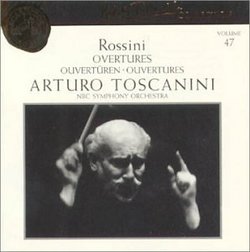| All Artists: Rossini, Toscanini, NBC Title: Overtures Members Wishing: 0 Total Copies: 0 Label: RCA Release Date: 3/10/1992 Genre: Classical Styles: Forms & Genres, Theatrical, Incidental & Program Music, Symphonies Number of Discs: 1 SwapaCD Credits: 1 UPC: 090266028924 |
Search - Rossini, Toscanini, NBC :: Overtures
CD Details |
CD ReviewsWow! Alto voltaje! Francisco J. Muņoz | Santa Cruz, Bolivia | 06/24/2000 (5 out of 5 stars) "Obviamente que no existen mejores versiones de las Overturas de Rossini que las interpretadas por el Maestro Arturo Toscanini. Solamente le pido que escuche la Overtura "Semiramide" y ver? que realmente este disco vale la pena. The Maestro once more! The Best!" Exciting, Delightful Rossini Robert E. Nylund | Ft. Wayne, Indiana United States | 01/24/2006 (5 out of 5 stars) "Yes, Arturo Toscanini (1867-1957) brought out the best in the wonderful overtures Rossini wrote for his operas. They have seldom sounded more exciting and delightful than in the recordings he made with the NBC Symphony Orchestra. Many of these recordings were made in Carnegie Hall, including a number of sessions in 1945 that used RCA's innovative magnetic sound film system. They still have exceptionally good sound.
The overture to "The Italian Girl in Algiers" was taken from an NBC broadcast concert in 1950 in Carnegie Hall, presumably with the microphones set well back in the auditorium. So, amid numerous coughs and even slamming doors, one can hear a particularly lively performance of this music. Toscanini fully appreciated the famous Rossini crescendo, which became a trademark of the Italian operatic composer. Franz Schubert was so captivated by Rossini's music that he wrote two overtures "in the Italian style." Few conductors were able to have better results with perhaps Rossini's most famous overture, and the last he composed, the one for his 1829 finale "William Tell." Recorded in 1953, when television and radio audiences were accustomed to the finale to the overture, Toscanini managed to avoid any trivialities or comparisons with the theme associated with "Hi, ho, Silver!" This, and the 1952 broadcast version (also available on video from the NBC telecast), are top notch performances. One can listen to the overtures and enjoy them independently of the wonderful operas which they introduce. These are particularly fine performances throughout. " |


 Track Listings (8) - Disc #1
Track Listings (8) - Disc #1